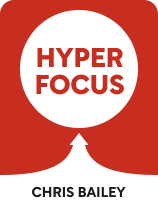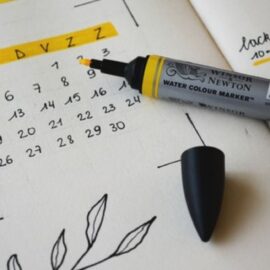

This article is an excerpt from the Shortform book guide to "Hyperfocus" by Chris Bailey. Shortform has the world's best summaries and analyses of books you should be reading.
Like this article? Sign up for a free trial here .
Why is rest so important for your brain? What are the best ways to let your brain relax?
Chris Bailey, the author of Hyperfocus, argues that brain rest is essential for productivity. He discusses why rest matters, the two ideal methods of rest, and the importance of sleep when it comes to cognitive performance.
Continue reading to learn how to relax your brain.
How to Relax Your Brain Properly
We’ll first explain why rest is essential for productivity. Then, we’ll cover the two main techniques you can use to rest: intentional mind-wandering and sleep. You’ll learn how to relax your brain—understanding why intentional mind-wandering is restful and why avoiding it might be making you even more tired than you are already. You’ll also learn exactly how and when to intentionally mind-wander for maximum productivity. Then, you’ll learn how getting a good night’s sleep can improve productivity and creativity—and three simple ways to improve your sleep.
(Shortform note: Bailey exclusively discusses how intentional mind-wandering can replenish your mental energy, but many texts suggest that restoring your physical energy can help your mental energy as well. For example, in High Performance Habits, Brendon Burchard discusses how maintaining mental, emotional, and physical health can improve and maintain your mental clarity.)
Why Rest Matters
Bailey explains that rest is essential to our productivity because it affects our working memory capacity. As we’ve seen, our ability to be productive depends on our working memory capacity. The more working memory capacity we have, the more we are able to focus appropriately on whatever we need to do.
However, your working memory capacity depends on your mental energy: The more mental energy you have, the more working memory capacity you have. With more working memory capacity, you can pay attention to more things simultaneously and be more productive. The less mental energy you have, the less working memory capacity you have. When you have less working memory capacity than usual, you can’t pay attention to as much information as normal and so you become less productive.
Therefore, in order to be your most productive self, you need to be properly rested.
(Shortform note: Bailey’s description of working memory capacity and productivity are a little abstract, so it may be more helpful to consider the physical toll knowledge work takes on your brain and body. In order to focus, your brain and body burn fuels such as oxygen or glucose. This process creates byproducts such as metabolic waste—and when enough of these accumulate, you experience them as stress. Taking regular breaks allows your body to flush all of these byproducts out of your system and restore your energy sources so you can eventually return to your task at full capacity.)
However, many of us feel guilty when we take a break. This is especially true the busier we are. When we are supposed to be resting, our minds instead turn to all of the other things we should be doing.
So in order to rest properly despite this guilt, Bailey encourages us to reframe how we rest. Instead of viewing breaks as a waste of time, view them as an essential element of being the most productive, healthy version of yourself. If you have trouble with this, Bailey urges you to imagine the most and least productive times of your life. Chances are, during the most productive times, you were regularly taking breaks, while the least productive times were the times you were most fatigued. (Shortform note: If you can’t figure out how regular rest affects your life, try a sleep journal. Spend a week or two tracking the times you go to bed and wake up, the quality of your sleep, and your productivity. What correlations do you see?)
The Ideal Methods of Rest: Intentional Mind-Wandering and Sleep
So what is the best way to rest? Bailey recommends two main techniques—practice intentionally mind-wandering regularly and get a good night’s sleep.
Why, How, and When to Intentionally Mind-Wander for Better Rest
The first technique Bailey recommends for better rest is to practice intentional mind-wandering regularly.
Why should you intentionally mind-wander regularly? Bailey implies that your avoidance of mind-wandering could be increasing your exhaustion levels. We’ve already discussed how mind-wandering is restful partly because it lets you temporarily stop regulating your behavior. Bailey also argues that mind-wandering is more restful than the activities most of us use to rest. As we’ve seen, most of us avoid mind-wandering on breaks. Instead, we rest with activities like scrolling through our phones.
However, according to Bailey, such activities still consume our attention and engage our mind—so they’re not actually as restful as we think they are. If you rest exclusively with these activities, you never totally disengage your attention and thus never get a real break. Therefore, you’re more tired than you would be if you mind-wandered intentionally.
| Why Some Break Activities Exhaust You Bailey’s argument above is confusing. He states that the activities we use to rest aren’t restful because they “still require our attention, [so] we never truly have a chance to recharge.” But everything requires at least some attention—including the methods Bailey suggests for intentional mind-wandering. Compounding this problem, it’s unclear what exactly counts as a non-restful activity: Bailey states that during breaks, we “become too busy checking social media and the news and distracting ourselves in other ways without stepping back to actually let our minds rest.” This logic is circular—it defines a non-restful break activity as an activity that doesn’t let you rest. Furthermore, Bailey previously defined distraction as something that diverts you from your original intention—so if your intention is to check social media on your work break, that shouldn’t count as a distraction. It seems likely that Bailey’s argument isn’t about whether a break activity requires your attention but how much it requires. Activities like checking social media and the news probably require more working memory than the activities you use to intentionally mind-wander, so they exhaust you more than intentional mind-wandering does. This article suggests another possibility: You use the same mental processes you use when you work to check social media and the news, so you don’t give those processes a break, which increases your exhaustion. |
(Shortform note: If you stare at screens for work and during your breaks, screen overuse may also contribute to your exhaustion levels. Staring at screens strains your eyes and can wreak havoc on your sleep schedule. (Screens emit blue light, which can increase alertness). To reduce eye strain, follow the 20-20-20 rule: every 20 minutes, look at something 20 feet away for 20 seconds. To limit how screens affect your sleep, purchase a screen filter or blue-light-blocking glasses.)
The Most Restful Activities for Intentional Mind-Wandering
But how exactly, can you disengage your attention and intentionally mind-wander for better rest?
There are two keys: know what to do and know when to do it.
The “what” is simple: Pick an easy and enjoyable task—like the one you use to enter “habitual mode.” Choose something you can do at work, since that’s most likely where you’ll want to regularly recharge your energy.
| What Activities Are Restful? Some of the activities Bailey suggests you use to rest are confusing. For example, he suggests reading a book during your lunch break. But shouldn’t reading thoroughly engage your attention and up a lot of working memory? In fact, this article explains that only activities that are social or relaxing (like mind-wandering) benefit you during breaks; activities that are cognitive (reading) or nutrition-based (having a snack) do not. For best results, consider something physical that gets you away from your desk, like staring out the window or rubbing lotion into your hands. These are especially effective if you work at a computer, since both suggestions give your eyes and your hands a break from repetitive motions and staring at a screen. |
When to Intentionally Mind-Wander for Better Rest
The “when” is more complicated. Bailey recommends taking regular breaks throughout your workday in order to maximize your productivity. He adds that it’s best to take these breaks before you feel tired: He argues that you only start to notice your exhaustion after your productivity has already dipped. (Shortform note: Similarly, many people don’t realize they’re sleep-deprived because fatigue isn’t always its main symptom. If you’re feeling more sensitive than usual, you may need to take a break or get more sleep.)
However, when exactly you need to take a break depends on several individual factors like your workload and your energy levels on a particular day. Therefore, Bailey recommends two strategies to discover your ideal break time:
Strategy #1: Experiment.
As Bailey explains, it’s best to rest when you have low mental energy. But since regulating your behavior consumes mental energy, the amount you use every day varies. Generally speaking, tasks that require more focus use more energy than simple tasks. But if you hate your job and have to force yourself to do even the simplest task, you will tire very quickly. So the best way to determine when to take a break for maximum productivity is to experiment. (Shortform note: As you experiment, keep a journal to track exactly what you do and how it affects your productivity. As we’ve seen, our memory is limited, so relying on it may be a losing strategy.)
Strategy #2: Pay attention to when your energy begins to falter. Bailey explains that, just as we sleep in 90-minute cycles, our mental energy occurs in 90-minute cycles. We feel energized for 90 minutes, then tired for about 20. As such, Bailey recommends paying attention to your energy levels throughout the day and resting when they start to decrease. Specifically, Bailey recommends resting every 90 minutes to take advantage of this natural rhythm. This natural rhythm Is not as regular in the afternoon, but Bailey recommends following it anyway for the sake of consistency. (Shortform note: This energy cycle is biologically known as your ultradian rhythm, and it’s another reason why taking regular breaks is so important. Research shows that if you power through dips in energy, your next energy peak isn’t as high as it is when you rest appropriately.)
But you might also notice your energy falter when you finish a big task. Taking a break then has the added benefit of letting your attentional residue dissipate so you can perform better on your next task. (Shortform note: In addition to yawning and general loss of focus, signs you might need a break include hunger, thirst, physical clumsiness, and the urge to use the restroom.)
Another way to ensure you’re taking regular breaks is to rest every 15 minutes per hour of work you do. This recommendation is based on a company that found that its most productive users worked for 52 minutes, then rested for 17 minutes. Following either of these time recommendations adds up to about 90 minutes of rest throughout a typical workday—like one hour for lunch plus two 15-minute breaks throughout the day. (Shortform note: Bailey argues that this is easy, suggesting that you take a coffee break or go to the employee nap pod. Although his book is geared towards knowledge workers, who might be more likely to have access to these things, not all knowledge workers have the ability to take breaks like this. Plenty of people have to clock out for breaks, and many are not allotted 90 minutes of break time each day. If you are committed to taking regular breaks, it may be worth talking to your boss about its benefits.)
Why and How to Sleep Better
The second technique Bailey recommends for better rest is to get a good night’s sleep.
A good night’s sleep is essential for good productivity because it increases your working memory capacity by nearly 60%. As we’ve seen, working memory capacity is essential to productivity—so the better you sleep, the more productive you are.
If you feel productive on little sleep, it might be because you think you’re more productive than you actually are—a common side effect of sleep deprivation, Bailey explains. He also suggests that you may be taking on easier tasks and that you could have gotten even more done had you slept longer. (Shortform note: Bailey doesn’t offer concrete reasoning for this, but Why We Sleep does. It explains that less than 1% of the population is able to get six hours of sleep and show no impairment—and this is largely genetic. It also adds that not only does sleep deprivation make you unaware of how poorly you’re performing, chronic sleep deprivation makes this poor performance your new baseline—so it’s even harder for you to see just how badly you’re performing.)
| Bailey focuses exclusively on how our reduced working memory capacity due to poor sleep affects our productivity. However, if you drive regularly, a bad night’s sleep is dangerous: In 2017, driving while sleepy led to 91,000 car accidents in the United States. This may be because driving requires you to pay attention to several things at once, which you can’t do as well with reduced attentional capacity. |
So how can you get a better night’s sleep? Bailey recommends three simple techniques.
#1: Remember that one hour of bad sleep equals two hours of poor productivity.
Bailey readily admits that this is a personal rule with little scientific basis—so why introduce it at all? It’s probably because even though the rule is inexact, it’s catchy and easy to remember. Most of us have known for years that sleep is critical to productivity, but we still have trouble getting to bed on time—partly because we forget the toll sleep takes on productivity until we’re struggling at work the day after a poor night’s sleep. This simple formula makes that toll clear, which likely makes getting to bed easier. It’s much harder to convince yourself that staying up three hours past your bedtime is a good idea if you equate that to six hours of lost productivity the following day.
#2: Create a bedtime ritual.
Most of us rely on willpower to get to bed at a decent time. But when you’re tired, your brain reverts to autopilot mode: Instead of managing your attention deliberately, you start to react automatically to external triggers. Therefore, Bailey recommends creating a bedtime ritual to improve your sleep quality.
| Why a Bedtime Ritual Helps When You’re in Autopilot Mode Bailey doesn’t make explicit why creating a bedtime ritual is good for a brain in autopilot mode. But as we’ve seen, you perform habits in autopilot mode: To develop the habit, you repeatedly perform the same action when you encounter a specific external trigger. It becomes a habit when you start to automatically perform that action whenever you encounter that trigger. By creating a bedtime ritual, you develop habits that enhance your sleep length and quality. So it doesn’t matter that your brain reverts to autopilot mode when you’re tired because you’ve designed both your external triggers and your reactions to them to improve sleep. For example, your phone might automatically turn off at 10 P.M., which triggers you to begin preparing for bed. But when you don’t have good sleep habits in place, your external triggers and automatic reactions might decrease your sleep length and quality. For example, you might get a vibrating text notification at 10 P.M., which triggers you to pick up your phone. If you weren’t tired, you’d respond to the message and turn the phone off because you know it’s late and you want to get a good night’s sleep. But if you’re tired and operating in autopilot mode, you might respond to the text message then automatically check social media because that’s what you normally do—and this could trigger hours of scrolling that cause you to go to bed much later than planned. |
(Shortform note: If you’re in a relationship, Eyal suggests that developing a bedtime routine in conjunction with your partner can help improve your relationship For example, Bailey suggests removing the TV from your bedroom—Eyal goes a step further and suggests removing all devices, such as by replacing your phone alarm with an analog clock.)
#3: Go to bed early.
While sleep needs vary by person, Bailey suggests that most of us need at least eight hours of sleep. (Shortform note: The 4-Hour Body suggests that we can gain the same sleep benefits with polyphasic sleep, which is when you divide your sleep into chunks instead of sleeping for long stretches every night.)

———End of Preview———
Like what you just read? Read the rest of the world's best book summary and analysis of Chris Bailey's "Hyperfocus" at Shortform .
Here's what you'll find in our full Hyperfocus summary :
- Why it's just as important to learn how to manage your attention, along with your time
- Why you still feel tired no matter how many breaks you take
- Strategies for managing your attention for better productivity and creativity






